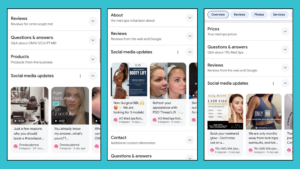
While Google makes tweaks to its eponymous ad platform quite frequently – there’s one change unfolding right now that should make every search advertiser take pause: the phasing out of Broad Match Modified (BMM) keywords.
As of February 18th, BMM and Phrase Match keywords function the exact same. By July 2020, “new” Phrase Match will fully replace BMM.
For healthcare practices that use search advertising, 4 questions that immediately come to mind:
- Remind me … what are BMM & Phrase Match keywords?
- Why is Google making this change?
- What impacts should I expect?
- What should I (or my campaign manager) do to adapt my practice campaign?
We’ll share our thoughts on all that. Stick around!
Broad Match Modified & Phrase Match Keywords
Traditional BMM keywords lived between Broad and Phrase Match on the Match Type spectrum (if we can call it that).
BMM has been useful when certain terms MUST be present in a query – but the exact order of the terms isn’t as important. If the order IS important though, then folks use Phrase Match instead.
For example, say we ran a BMM keyword – +herniated +disc treatment. The Google platform would know from the “+” sign that herniated and disc were mandatory terms, but the word treatment was not.
Based on our understanding of the update, we’ve provided some examples of how query matching could function going forward.
|
Broad Match Modifier Keyword |
Queries that will likely no longer match |
|
+lower +back +treatment |
back treatment lower east side nyc |
|
+best +spinal +surgeon |
best hospitals for spinal surgeons |
|
Phrase Match Keyword |
Queries that will likely match |
|
“herniated disc treatment nyc” |
herniated disc pain treatment in nyc |
|
“failed back syndrome specialist” |
failed back syndrome local specialist |
Google’s Shifting Keyword Match Types
The truth is – Google’s been playing with keyword Match Types for years. To many in the industry, removing BMM altogether isn’t a shocking step.
It used to be the case (years ago actually) that each Match Type had a well-defined, more predictable matching logic. Each of the 4 Match Types were distinct.
Flash forward to 2021, and the definition of each type has gotten blurry. Google has rolled out Match Type logic changes every couple of years – and those have watered down the Match Type differences.
At the end of the day, it stems from Google’s emphasis on improving search intent comprehension. As the search engine has improved its search intent skills, the importance of keyword Match Type distinction has dwindled.
All this to say – because there’s more fluidity baked into the current Match Types, there’s not as much need for 4 separate ones. At this point, it’s arguably redundant to have both Phrase and BMM.
General Changes to Expect
“With this updated matching behavior, ads may show on searches that include the same or more specific meaning as your keyword. This can lead to an increase in traffic on any Phrase Match keywords and a slight decrease in traffic on any BMM keywords.” – Google
It’s clear some keywords will see more traffic … and others will see less. Phrase Match keywords (which should see more traffic) could be the culprits behind performance dips.
Why? Well, if the additional searchers who see your ad aren’t interested in your product or service – then you could see lower click through and conversion rates.
It’ll be important for your practice to keep an eye on spend as well. Phrase Match heavy campaigns could start spending more money. Again – if the traffic is relevant, this could be positive.
Lastly – keep an eye on your conversion metrics. If conversion levels change, it will likely be due to either: 1) you’re getting irrelevant clicks on your old Phrase Match keywords, or 2) you’re getting fewer valuable clicks on your performing BMM keywords.
3 Campaign Optimizations
Your campaign manager should start by identifying campaigns where BMM and or Phrase Match deliver a significant percentage of traffic (try 25% or greater).
Once that person has done this – here are 3 critical optimizations to consider:
- Review the search term report and add negative keywords as needed. Pay close attention to the search queries coming off BMM keywords.
- Review high activity BMM and Phrase Match keywords and consider creating new Exact Match versions (look at the search terms report while you’re in there). Exact Match keywords will be the least susceptible to irrelevant traffic.
- Review daily spend data. Develop an understanding of whether you’re hitting the daily budget. Make sure any Phrase Match driven spend increases can be absorbed.
What Does This Change Really Mean?
Google’s stated goal is to make it “easier to reach the right customers on Search.”
While campaign mangers will spend time recalibrating PPC campaigns, we do feel this update could indeed reduce campaign complexity in the long-run. For RUNNER clients, we know time is of the essence. We prefer that they focus on what’s most important: treating patients and running their practice.
Ultimately, our clients rely on us to stay on top of changes like this and optimize their paid media accordingly. We approach Google paid media with a proven methodology that focuses on the patient experience. This method has helped us generate thousands of new patients and millions in revenue for our clients.
If you’d like expert Google paid media guidance, request a consultation or give us a call at (214) 396-8500.




